Immigrant Soldier
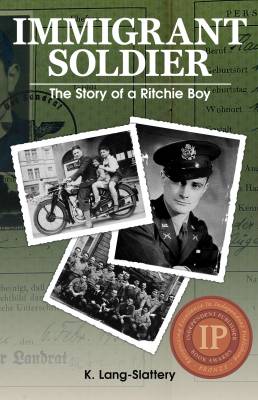
Immigrant Soldier, The Story of a Ritchie Boy based on the true experiences of a refugee from Nazi Germany, combines a coming-of-age story with an immigrant tale and a World War II adventure. On a cold November morning in 1938, Herman watches in horror as his cousin is arrested. As a Jew, he realizes it is past time to flee Germany, a decision that catapults him from one adventure to another, his life changed forever by the gathering storm of world events. Gradually, Herman evolves from a frustrated teenager, looking for a place to belong, into a confident US Army intelligence officer who struggles with hate and forgiveness.
Immigrant Soldier, The Story of a Ritchie Boy has earned several AWARDS including:
- Eric Hoffer Award, 2016, finalist in general fiction.
- B.R.A.G. Medallion Honoree
- Independent Publishers Book Awards (IPPY) 2015, Bronze medal in the Military/War Time Fiction category.
- The US Review of Books, recommended review. To read it on their web-site, follow this link.
- National Indie Excellence Award, Finalist in Military Fiction Category. 2016
- Runner-up in genre fiction from the Los Angeles Book Festival, 2016
- Silver medal rating from Mom’s Choice Awards
- Honorable mention in general fiction from the Southern California Book Festival, 2015
- Runner-up in Biography/Autobiography from Hollywood Book Festival, 2016
- Honorable Mention in History from Hollywood Book Festival, 2016




Author’s Notes
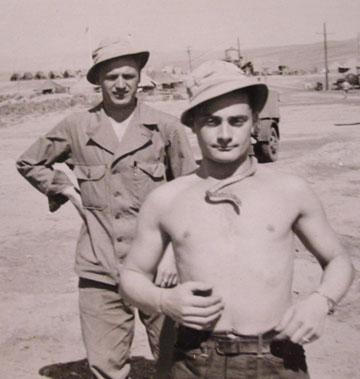
Herman during desert training in California
This book, though it closely follows a true story, is a work of fiction. The novel was based on hours and hours of conversation with my uncle, Herman Lang, between the years 1991 and 2006. All these interviews were recorded and transcribed. He loved telling humorous stories from his life and chuckled at his memories. He also shared with me his many albums of photos and news clippings. But when it came to details, Herman’s memory often failed. In order to bring time and place details to the story, I usually had to look elsewhere. This led me down a long path of research. I traveled to London to interview Herman’s older sister, Edith, and to Chicago to talk with Herman’s cousin, Leonora. Through e-mail, telephone, and personal interviews I also was able to talk to other Ritchie Boys who lived through similar experiences.
The events in this book, as they pertain to Herman’s life, are totally based on his memories. In the process of writing the novel, I have often needed to extract a short comment from Herman’s interviews and create from that snippet, a dramatic scene with conversation. I have also used the memories of other Ritchie Boys and historical research to inspire details.
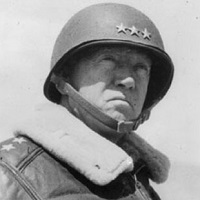
General Patton
Because the historical background and how it affects Herman’s life is so important to this story, I have endeavored to make all historical data, whether it is the small details or the larger events, accurate and true. The events in Herman’s life are basically as they actually happened. His friends, associates, and family are drawn from his memory or my own personal knowledge. A few minor characters are composites based on other Ritchie Boys or are entirely fabricated by me. When necessary, I have changed names slightly to protect the privacy of my sources. Historic personalities, such as General George Patton, Colonel Robert S. Allen, and the German, Richard Schulze, are in the book because their association with Herman actually occurred. These men are portrayed as accurately as I know how.
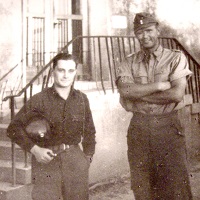
Herman and Richard Schulze
Where real-life or historical figures appear, the scenes they participate in and dialogue they speak are products of the author’s imagination. However, some of the public speeches made by historical figures in the novel (General Patton, Franklin D. Roosevelt) are taken from the public record and were actually spoken by them.
With the help of my sources, I endeavored to make the novel as true as possible. However any errors or inaccuracies are entirely my own.
Immigrant Soldier is a good choice for Book Groups.
Discussion questions downloadable here.
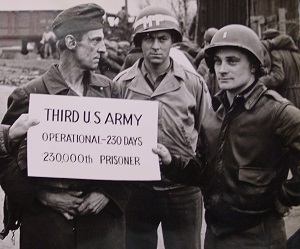
Herman with prisoner
Katie Lang-Slattery is pleased to offer presentations to a variety of organizations, including Friends of the Library, regional libraries, VFW, American Legion, book groups, war and military museums, and professional organizations.
In addition to standard readings and book signing, the author will provide the following talks on request.
-
- Discovering the Ritchie Boys of WWII
An overview of Camp Ritchie and the Ritchie Boys, the contributions to the WWII effort made by these men, and profiles of a few of the men the author has interviewed or researched. Kathryn will provide a short list of notable Ritchie Boys.
- More Than Simply “Based On:” The Evolution of Immigrant Soldier from Fact to Fiction
A brief synopsis of the origins of Immigrant Soldier followed by how the author slowly moved the story from non-fiction to fiction and the difficulties encountered along the way. The author will include several comparisons between the primary resource material and the finished novel.
- Discovering the Ritchie Boys of WWII
Sign up to receive the latest news, events and personal insights from Katie Lang-Slattery.
Dedication
Immigrant Soldier is dedicated to all those who, through premonition or foresight, determination and luck, were able to escape Nazi Germany before the trap was fully closed. Their lives were uprooted and changed forever. And, most especially, I dedicate it to those immigrant Ritchie Boys who returned to Europe and used their knowledge, experience, and training to help bring an end to the Nazi terror. Each day, fewer of these men are here to share their stories. Finally, but not least, I dedicate this book to the memory of Herman Lang and his wife, Marge. They welcomed me into their home, shared their stories, and encouraged me to write this book.
Reviews
“Lang-Slattery’s extensively-researched, richly-textured novel concentrates on a young German Jew named Herman Lang, whose life in Germany in the late 1930s is increasingly darkened by the growing savagery of the Nazi Party. His misgivings culminate in November 1938’s Kristallnacht pogrom, prompting him to set about the complicated and dangerous process of leaving the tightening web of the Third Reich. Lang makes his way to America, where he trains as an intelligence officer and later joins General George Patton’s Third Army in its drive across formerly Nazi-held Europe. Lang-Slattery grounds the memories and stories of Lang, who was her uncle, with a great deal of research, and she tells those stories in vivid prose and very lively dialogue to make a memorable WWII-era coming-of-age story. ” – Joanna Urquhart, Historical Fiction Society
This work of historical fiction closely follows the story of Herman Lang’s WWII experience. Lang witnesses the rise of anti-Jewish sentiment and laws as a young teenager in Germany, eventually gaining passage to England as he awaits a hard-won U.S. visa. He succeeds, but is carried forward into the tides of war. . . . The plot follows Lang’s service in the Third Army under General Patton as they battle eastward through France and Germany. Most of the characters are based on famous WWII personalities like Patton, with special focus on the G-2 Intelligence Service of the U.S. Army. . . . Lang succeeds in his mission through accurate character assessment and intellectual guile. . . . The author, Captain Lang’s niece, has relied heavily on facts, only fleshing out conversations and internal thoughts of characters. A useful map and a short biography of the real Herman Lang is provided. The result is engaging and informative. – US Review of Books
“In this debut historical novel, a young German Jew flees his homeland before World War II and is later drafted into the US Army, serving closely under the legendary Gen. George S. Patton. Lang-Slattery effectively mines family history to create a solid work of historical fiction from her uncle’s real-life derring-do. . . . In the sunny glamour of the book’s California passages, she effectively evokes the young immigrant’s overflowing hope. . . . Overall, her uncle’s fictionalized adventures never fail to interest, whether he’s slipping behind the lines for Patton or simply attempting to romance the local girls. An often engaging tale of one man’s involvement in the world’s most horrific war.” – Kirkus Reviews
Immigrant Soldier is a fascinating recital of a “new American’s” contribution to winning World War II and liberating Europe from Nazi tyranny. The hero, Herman Lang, in one year, 1944–1945, did more than many people do in a lifetime. He lived in a period when twenty-year-olds had monumental challenges thrown at them. From second lieutenant to captain in the US Army, in charge of thousands of German POWs, Lang, a native German linguist, met every challenge . . . and more. Famed General George S. Patton, Third US Army Commander, recognized his talent and took advantage of it. A captivating book, extremely well written. Thanks to the army’s Camp Ritchie Military Intelligence Training Center for molding soldiers like Herman Lang and to the author for sharing his story with us. Ralph M. Hockley, Colonel, US Army (Ret); Career Army Intelligence Officer, 1952-1980; and a Ritchie Boy
“K. Lang-Slattery has uncovered small but significant details that not only add to the fascination of her novel, but also bring material before the public never hitherto disclosed. Beyond that, her brief character sketches bring us, in miniature, samples of the “Greatest Generation.” And her style keeps the reader glued to the page!”
Guy Stern, Distinguished Professor Emeritus; Director, International Institute of the Righteous, and Ritchie Boy.
Copyright © 2019 klangslattery.com – Website designed by Eminent Graphic Design | All Rights Reserved | Terms and Conditions | Privacy Policy




